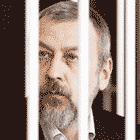25 Jan 2012 | Europe and Central Asia, Index Index, minipost
Igor Vinyavsky, editor of the Almaty-based independent weekly Vzglyad, was detained on Monday evening in an ongoing crackdown by Kazakhstan‘s National Security Committee (KNB) on critical media and opposition activists. Two groups of KNB agents simultaneously raided Vinyavsky’s apartment and Vzglyad’s offices, confiscating all reporting equipment. Vinyavsky was detained following the newsroom raid. The crackdown has also involved a raid on independent broadcaster Stan TV.
25 Jan 2012 | Middle East and North Africa
Monday 23 January will be remembered as a grim day for freedom of expression in Tunisia.
In addition to the trial of Nabil Karoui, general director of Nessma TV, accused of “violating sacred values” and “disturbing the public order” for broadcasting the film Persepolis, journalists and activists standing in solidarity with the TV station were physically and verbally abused by ultraconservative Islamists.
Zied Krichan, a journalist and and blogger Liliah Weslati were among the victims of such assaults.
Krichan was followed as he walked outside the court where the trial was taking place, insulted, and pushed by protesters. When his colleague Hamadi Redissi tried to defend him, he too was physically assaulted.
Krichan is the editor-in chief of the daily Le Maghreb, which describes itself as a newspaper “against all threats to the modern achievements of Tunisia”. The front-page of its 218th issue, published on 22 January included a photo of Karoui, with the headline “the wrong trial.”
Krichen said he lodged a complaint against those who assaulted him. In an interview with Le Maghreb, he expressed his “astonishment” at the passiveness of the Interior Ministry. ”The slogans that were raised, were raised against me as a journalist; the media is the target of these groups”, he said.
Prime Minister Hamadi Jebali condemned the “violation of the physical integrity of Mr. Krichen”, saying that an investigation will be opened, and that the attacker will be punished.
Liliah Weslati, who was also verbally and physically abused while she was protesting outside the court, described the Prime Minister’s intervention as “excellent”, but said she is looking forward to “concrete acts”.
“I don’t like Nessma TV, and I don’t watch it, but I protested for freedom of speech,” she told Index on Censorship.
Weslati held a banner that read “Even in the Quran Satan had the right to talk”. On two occasions, anti-Nessma protesters forcibly took away the banner from her. Other protesters told her to “go back home”. She was even threatened with death. Aymen Amri, Weslati’s colleague, was also attacked as he attempted to videotape the way she was mistreated. He was pushed over, and the camera fell to the ground.
Weslati told Index:
There is a campaign against me on Facebook (…) they are calling me the ‘Devil’s friend’ (…) once I arrived home I changed the jacket I was wearing outside the court, I was afraid they would recognise me.
With the fall of the former ruler Zeine El Abdine Ben Ali, journalists and activists started to breathe. The numbers of police assaults on journalists fell and activists have enjoyed rights and freedoms they never had before: the right to assemble, protest and to criticise.
This kind of brutality, in the name of the religion endangers these new freedoms. In order to avoid establishing a pattern of abuse, in which such assaults are repeated over and over, the Tunisian authorities and the judiciary must act now to bring such extremists to justice.
25 Jan 2012 | Leveson Inquiry
Blogger and media lawyer David Allen Green has praised social media at the Leveson Inquiry today.
Green, legal commentator at the New Statesman, argued that bloggers and Twitter users should not be viewed as “rogues”, adding that social media users often act responsibly and regulate themselves by being transparent.
“Most alleged abuses by people using social media can often be traced back to someone who may or may not have an agenda,” he said.
He added it was “wonderful” that mainstream sources were co-operating with social media users, noting that “almost every journalist now has a Twitter account” and that the platform is increasingly used to distribute breaking information quickly.
Revealing he has made about “about £12” from advertisements on his Jack of Kent blog, Green told Lord Justice Leveson bloggers do not blog for the money but to “engage in public debate…[and] be part of a civic society.”
He claimed the mainstream media’s use of photographs from social media sites such as Facebook was “analogous” to the phone-hacking scandal, noting that newspapers do it “routinely” without recognising that it is a form of copyright infringement.
The editor-in-chief of the Press Association, Jonathan Grun, also appeared today. He said the news agency, which provides a “constant stream” of stories and video to major British news organisations, placed great emphasis on accuracy, adding that its customers needed to be able to rely on it without making checks.
He said most editorial mistakes occur “by accident”. He described one occasion in which a PA reporter with 30 years of experience confused someone named in a story with another person of the same name. Grun said it was the agency’s “gravest editorial error”, adding that the reporter was so ashamed that they resigned.
There will be a directions hearing for Module 2 of the Inquiry, which will examine the relationships between the press and police, later this afternoon.
Hearings continue tomorrow, with evidence from representatives from Facebook and Google, the Information Commissioner’s Office and journalist Camilla Wright.
Follow Index on Censorship’s coverage of the Leveson Inquiry on Twitter – @IndexLeveson

